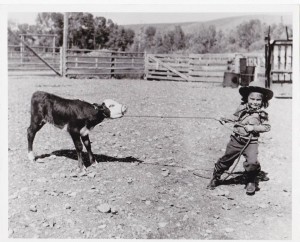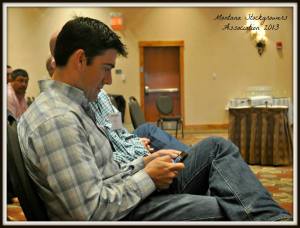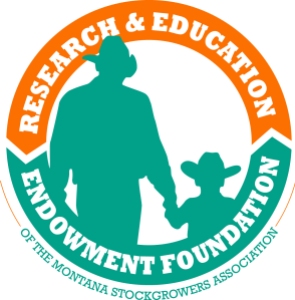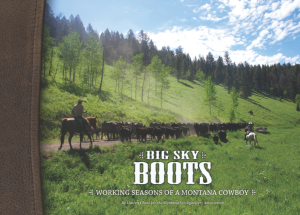 Betsy Indreland stands behind a table supporting two red coolers full of beef cuts. She smiles at people as they check out her stand at the Livingston Western Sustainability Exchange. A man in a plaid shirt and khaki shorts asks Betsy where the beef is raised. She replies that the beef is raised on her family’s ranch located near Big Timber. The man thinks that is great and proceeds to purchase several different packages of Indreland Angus Beef.
Betsy Indreland stands behind a table supporting two red coolers full of beef cuts. She smiles at people as they check out her stand at the Livingston Western Sustainability Exchange. A man in a plaid shirt and khaki shorts asks Betsy where the beef is raised. She replies that the beef is raised on her family’s ranch located near Big Timber. The man thinks that is great and proceeds to purchase several different packages of Indreland Angus Beef.
Selling dry-aged beef directly to consumers at farmers’ markets is not anything out of the ordinary for the Indreland family. Since 2003, Betsy and her husband, Roger, have sold 100 percent natural Montana beef at markets in Billings, Bozeman, Big Timber, and Livingston. They also ship their products across the country and provide Indreland Angus beef at local restaurants, grocery stores and even the Livingston hospital.
“It became evident to us that people want quality beef and know where it came from,” explained Betsy.
On the Indreland Angus beef package label, there is a product identification number, which corresponds to the animal’s ear tag number. This allows for complete access to the records of the cattle, if a buyer has questions.
“People like the idea that all the meat in that package came from one animal,” says Roger. “They also like the ranch information provided.”
The Indreland’s beef business did not start with the idea that they needed to grow to a certain size to be able to make it work. Instead, Roger and Betsy allow it to grow only if it is profitable.
One way the Indreland’s beef remains profitable is by appealing to customers of a niche market. The beef is natural which means the animal is not given growth hormones or antibiotics. Most of the cattle are finished with corn, but a few customers requested grass-fed only and therefore, Roger and Betsy raise a few head per year on a grass diet.
“We understand that we operate in a niche market,” says Roger. “If you’re providing a consumer who wants beef from a known source, wants beef to be a certain grade, and wants dry-aged cuts, then that means that we’re not competing with the large segments of the beef industry. Those larger segments of the industry do not dry-age their beef. It’s the dry-aging that makes a huge difference in the flavor profile.”
The Indrelands understand that the majority of the beef industry does not operate using a custom market model
“Our product is definitely gourmet,” said Roger.
One of the benefits of utilizing this gourmet market is the ability to converse directly with the consumer about the ranch lifestyle.
“We become the ambassadors of the beef industry and explain how we do what we do and why we do it. This helps to put a face with the beef products, and makes ranching more personable,” said Betsy.
Being a marketing major, Betsy understood the value of the niche market, but also realized how important it was to direct market Angus beef.
“When we started, we knew we had to have the word ‘Angus’ in our product name. Angus cattle are known for their premium beef quality. The Certified Angus Beef Brand has done wonders with their promotion and educating people on the attributes of Angus beef. It is recognized worldwide as a premiere beef product. We couldn’t pass up that opportunity with ours,” said Roger.
ANGUS FAMILY TRADITIONS
 Selling Angus beef stems from a history of raising Angus cattle in Roger’s family. The Indreland Angus Ranch originated in 1976 when Roger purchased 13 registered bred heifers for a FFA project in high school. He chose to get into the Angus breed because his grandfather, Arch Ginther, was one of the founders of the Montana Angus Association. Roger’s mother and aunt continued the black cattle traditions by showing them in the 1940s and ‘50s and encouraged Roger to raise Angus as well.
Selling Angus beef stems from a history of raising Angus cattle in Roger’s family. The Indreland Angus Ranch originated in 1976 when Roger purchased 13 registered bred heifers for a FFA project in high school. He chose to get into the Angus breed because his grandfather, Arch Ginther, was one of the founders of the Montana Angus Association. Roger’s mother and aunt continued the black cattle traditions by showing them in the 1940s and ‘50s and encouraged Roger to raise Angus as well.
Roger’s herd continued through college as he worked with Leachman Angus in Bozeman, learning about the purebred industry. After college, his parents retired and Roger leased the ranch, expanding the registered cowherd. Roger married Betsy in 1986.
Betsy was born in New Jersey and later moved to Big Timber where she met Roger. She did not grow up on a ranch.
“I didn’t know the difference between a heifer and a Hereford, just that the two sounded alike. But I’ve learned a lot,” said Betsy.
The Indrelands are raising two daughters on the ranch. Anne was born in 1993 and Kate in 1998. The addition to the family solidified the need to be more involved in the Angus business and start the small branded beef program.
In August 2011, Anne started her freshman year of college at Claredon College in Claredon, Texas. She was awarded a scholarship to be on the livestock judging team and will study agriculture-business and animal science. Kate is in 7th grade and does livestock judging. She has a few chickens and sells the eggs as a business. Both girls have their own cattle in the Indreland herd and according to their parents, are passionate about ranching and taking care of those animals.
LOW-INPUT RANCHING
On the ranch, the Indrelands run about 200 mother cows and out of that, they raise bulls. This year, they will sell 65 coming 2-year-old bulls and 25 bred heifers on December 10.
Because the beef business side of the operation demands a lot of time, Roger and Betsy try to maintain the cowherd as hands-off as possible. Living just north of Big Timber, Roger says the grass opens up in the wintertime and therefore, they do not have to feed hay everyday. This allows the focus to be on planning for the beef marketing or ranch needs.
The other benefit of where they are located is that the 2-year-old bulls they sell are coming off summer grass and have developed slowly.
“I think the longevity of those bulls is really great and they’re adaptable for whatever the commercial people have for them,” said Roger. “They’re going to be moderate size cattle with moderate EPDs that truly should match a lot of Montana environment.”
Their production philosophy remains that cows must consistently excel at converting basic grass resources into beef.
“Practicing this philosophy has refined our cowherd into trouble free and productive cattle. We do not select for any extremes in performance but demand functionality,” said Roger.
Operating under the philosophy of low-input ranching and creating profitability of a direct marking business, the Indreland family will continue to provide quality beef to consumers while maintaining the ranching lifestyle they love. To find out more information on their ranch or to view the beef products for sale, visit www.indrelandranchangusbeef.com.
*Originally published in the Montana Stockgrowers Newsletter, January 2012
*Article and photos sponsored in part by the Montana Angus News
 A big thank you to the American Fork Ranch for this Throwback Thursday photo. Be sure to give them a ‘Like’ on Facebook.
A big thank you to the American Fork Ranch for this Throwback Thursday photo. Be sure to give them a ‘Like’ on Facebook.










